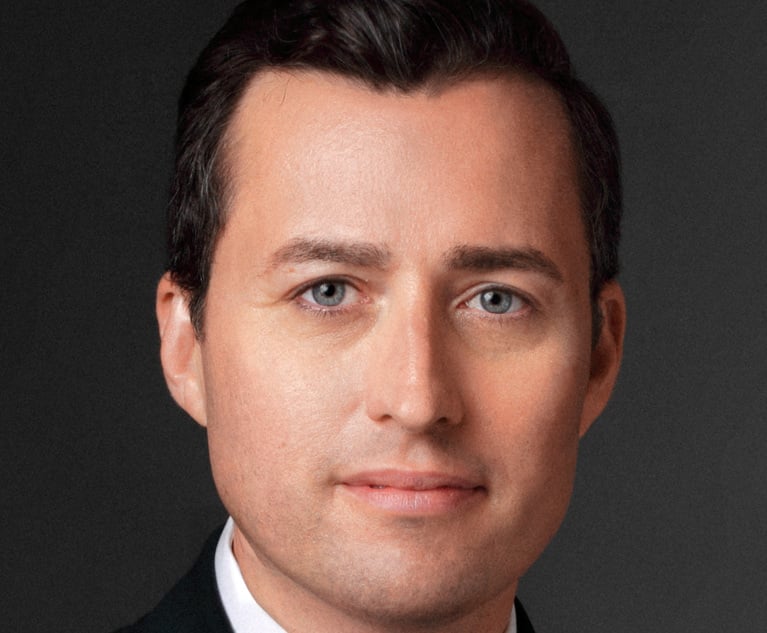D&O Liability Insurance: What Will Impact Be of a Kinder, Gentler Corporation?
The transition in progress from the "profits only" approach of Friedman to an ethos embedded in the legislation proposed by Senator Warren and the public statements of CEO's of public companies will alter corporate behavior and so, inevitably, the D&O liability and insurance landscape.
October 11, 2019 at 02:20 PM
9 minute read
 We are in the midst of a clash of ideas straddling generations. In 1970, the economist Milton Friedman asserted in a New York Times Magazine essay that "there is one and only one social responsibility of business … to increase its profits so long as it stays within the rules of the game." That argument gained traction and helped shaped corporate behavior from the 1980s forward. A half century later, presidential candidate Sen. Elizabeth Warren sought to reverse the tide with a bill called the Accountable Capitalism Act, which would require large companies to consider the interests of various corporate stakeholders, including employees, customers, shareholders, and the communities in which the company operates.
We are in the midst of a clash of ideas straddling generations. In 1970, the economist Milton Friedman asserted in a New York Times Magazine essay that "there is one and only one social responsibility of business … to increase its profits so long as it stays within the rules of the game." That argument gained traction and helped shaped corporate behavior from the 1980s forward. A half century later, presidential candidate Sen. Elizabeth Warren sought to reverse the tide with a bill called the Accountable Capitalism Act, which would require large companies to consider the interests of various corporate stakeholders, including employees, customers, shareholders, and the communities in which the company operates.
In a similar vein, an update of the Business Roundtable's "Statement of the Purpose of a Corporation," signed by 181 member CEOs, eschews a sole focus on the shorter-term interests of shareholders in favor of "a fundamental commitment to all of our stakeholders." Those stakeholders are specified as employees, suppliers, communities and shareholders. Indeed, Satya Nadella, chief executive of Microsoft, was quoted in The Economist saying that a sense of purpose—together with a mission that is "aligned with what the world needs"—is part of building public trust, acknowledging that "there is a moral obligation."
This change in narrative will prompt public discussion and developments in law—potentially leading to changes in the application of long-established rules related to whether a board of directors should focus solely on the short-term best interests of shareholders.
A change in focus from shareholder primacy to multiple constituencies may well lead to a reduced severity of shareholder claims, which historically have resulted in the most hazardous D&O liability insurance claims. Although other constituencies may be emboldened to bring novel D&O claims, it seems likely that such claims would be of a lower severity than those classic shareholder claims.
CEOs Redefine the Corporation's Stakeholders
The Business Roundtable's updated Purpose Statement asserts: "While each of our individual companies serves its own corporate purpose, we share a fundamental commitment to all of our stakeholders." It concludes: "Each of our stakeholders is essential. We commit to deliver value to all of them, for the future success of our companies, our communities and our country."
While many would consider these affirmations to be grounded in common sense, they may be in tension with current legal doctrine—most notably in Delaware. How that tension is resolved remains to be seen.
Delaware Law Remains Out-of-Step With the New Definition
While Delaware has focused for decades on the benefit to a single constituency—shareholder primacy—other states have enacted statutes that permit or require the consideration of the impact of decisions upon other constituencies. For example, New York permits consideration of employees and retired employees entitled to receive retirement benefits and other stakeholders. N.Y. BUS. CORP. LAW §717(b)(i)-(v) (McKinney 1989):
(b) In taking action, including, without limitation, action which may involve or relate to a change or potential change in the control of the corporation, a director shall be entitled to consider, without limitation, (1) both the long-term and the short-term interests of the corporation and its shareholders and (2) the effects that the corporation's actions may have in the short-term or in the long-term upon any of the following:
(i) the prospects for potential growth, development, productivity and profitability of the corporation;
(ii) the corporation's current employees;
(iii) the corporation's retired employees and other beneficiaries receiving or entitled to receive retirement, welfare or similar benefits from or pursuant to any plan sponsored, or agreement entered into, by the corporation;
(iv) the corporation's customers and creditors; and
(v) the ability of the corporation to provide, as a going concern, goods, services, employment opportunities and employment benefits and otherwise to contribute to the communities in which it does business.
Nothing in this paragraph shall create any duties owed by any director to any person or entity to consider or afford any particular weight to any of the foregoing or abrogate any duty of the directors, either statutory or recognized by common law or court decisions.
Delaware by contrast adheres to a focused rule, articulated in In re Trados S'holder Litig., 73 A.3d 17, 36-37 (Del. Ch. 2013): "When exercising their statutory responsibility, the standard of conduct requires that directors seek 'to promote the value of the corporation for the benefit of its stockholders."'
That rule took hold over three decades ago, in Revlon v. MacAndrews & Forbes Holdings, 506 A.2d 173, 176 (Del. 1986), which might be said to mark the codification of Friedman's credo in the law of a state where, as of now, almost two-thirds of Fortune 500 companies are incorporated.
In Revlon, the Delaware Supreme Court "address[ed] for the first time the extent to which a corporation may consider the impact of a takeover threat on constituencies other than shareholders." The court found that "while concern for various corporate constituencies is proper when addressing a takeover threat, that principle is limited by the requirement that there be some rationally related benefit accruing to the stockholders."
In recent years, that strict rule has been perceived by some to be a straitjacket. For example, in eBay Domestic Holdings v. Newmark, 16 A.3d 1, 34 (Del. Ch. 2010), the founders of Craigslist argued that the company was permitted to favor communities of its users over shareholders. No dice: The Delaware Chancery Court found such behavior to be a breach of fiduciary duty owed to shareholders.
Having chosen a for-profit corporate form, the Craigslist directors are bound by the fiduciary duties and standards that accompany that form. Those standards include acting to promote the value of the corporation for the benefit of its stockholders. The "Inc." after the company name has to mean at least that. Thus, I cannot accept as valid … a corporate policy that specifically, clearly, and admittedly seeks not to maximize the economic status of a for-profit Delaware corporation for the benefit of its stockholders . …
Much more recently, in Marchand v. Barnhill, No. 533, 2018, 2019 Del. LEXIS 310 (Del. June 18, 2019) the Delaware Supreme Court suggested that it acknowledged the role that a compliance program has on shareholder value, which might be considered outside the short-term shareholder profit-maximizing approach.
Allowing for the interest of other stakeholders does not necessarily shake shareholder primacy, however. The Delaware Supreme Court Chief Justice Leo E. Strine has noted that "Revlon could not have been more clear that directors of a for-profit corporation must at all times pursue the best interests of the corporation's stockholders, and that the decision highlighted the instrumental nature of other constituencies and interests. Non-stockholder constituencies and interests can be considered … when giving consideration to them can be justified as benefitting the stockholders." Leo E. Strine Jr., The Dangers of Denial: the Need for a Clear-Eyed Understanding of the Power and Accountability Structure Established by the Delaware General Corporation Law, 50 Wake Forest L. Rev. 761, 771 (2015).
Thus, according to Justice Strine, a multi-constituency approach might remain a shareholder primacy rule in different guise. While acknowledging the validity of non-stockholder interests, this articulation of the issue seems inconsistent with the aspirations of Business Roundtable's Statement of the Purpose of a Corporation.
The current alteration of the discourse regarding the purpose of the corporation engenders some push-back as well. The retorts note accountability "to everyone" is "to no one," and that CEO compensation often is driven by increases in share price and not by accountability to other stakeholders.
Impact of D&O Liability and D&O Insurance Rates
The impact of the approach articulated in the Roundtable's Purpose Statement remains to be seen. Of course, a private organization's statement of principles will not in itself remake Delaware law. But judges are not impervious to changing conditions, including social change. Justice Strine's analysis at least suggests that the relationship between stockholder interests and those of other stakeholders is complex. A new willingness to introduce arguments reexamining that relationship may lead to shifts in law.
It does seem that since so much of past D&O liability—and associated insurance coverage disputes—has focused solely upon the impact upon short-term share price fluctuations, an approach that broadens the constituencies beyond shareholders probably will: (1) permit additional justifications for board decision making and reduce exposure related to share price fluctuations; and (2) possibly embolden other "new" constituencies to make claims against directors. The absence of the multiplicative power of shares outstanding probably would render such claims less severe. At the same time, the threat of liability from a wider circle of constituencies may help justify more corporate focus on the interests of stakeholders other than shareholders.
The somewhat mechanistic calculations of damages asserted by securities class action plaintiff's counsel might give way to a more pluralistic inquiry permitting corporations to broaden their defense to securities suits. Those counsel can be expected to resist this revised ethos, though judges may well credit the effort.
Such a forecast suggests that D&O liability insurance rates should, all things equal, be reduced by the adoption of a multi-constituency approach to director responsibility. The impact of such a multi-constituency approach probably lowers severity of shareholder claims, and possibly emboldens other constituencies to assert claims with a lower level of severity. Perhaps D&O liability insurance underwriters should begin trying now to see into that lower severity future.
The transition in progress from the "profits only" approach of Friedman to an ethos embedded in the legislation proposed by Senator Warren and the public statements of CEO's of public companies will alter corporate behavior and so, inevitably, the D&O liability and insurance landscape. The changing risk profile should also enter directors' and officers' calculations.
William Gorman Passannante is a shareholder in Anderson Kill P.C. and co-chair of the firm's insurance recovery group. He can be reached at [email protected].
This content has been archived. It is available through our partners, LexisNexis® and Bloomberg Law.
To view this content, please continue to their sites.
Not a Lexis Subscriber?
Subscribe Now
Not a Bloomberg Law Subscriber?
Subscribe Now
NOT FOR REPRINT
© 2025 ALM Global, LLC, All Rights Reserved. Request academic re-use from www.copyright.com. All other uses, submit a request to [email protected]. For more information visit Asset & Logo Licensing.
You Might Like
View All
Insurance Company Sues Over 180 Health Care Providers for Fraud Under RICO
3 minute read
New York Court of Appeals Tightens Pleading Standards Against Insurance Policyholder
7 minute read
Amid Growing Litigation Volume, Don't Expect UnitedHealthcare to Change Its Stripes After CEO's Killing
6 minute read
GE Agrees to $362.5M Deal to End Shareholder Claims Over Power, Insurance Risks
2 minute readTrending Stories
- 1Treasury GC Returns to Davis Polk to Co-Chair White-Collar Defense and Investigations Practice
- 2Decision of the Day: JFK to Paris Stowaway's Bail Revocation Explained
- 3Doug Emhoff, Husband of Former VP Harris, Lands at Willkie
- 4LexisNexis Announces Public Availability of Personalized AI Assistant Protégé
- 5Some Thoughts on What It Takes to Connect With Millennial Jurors
Who Got The Work
J. Brugh Lower of Gibbons has entered an appearance for industrial equipment supplier Devco Corporation in a pending trademark infringement lawsuit. The suit, accusing the defendant of selling knock-off Graco products, was filed Dec. 18 in New Jersey District Court by Rivkin Radler on behalf of Graco Inc. and Graco Minnesota. The case, assigned to U.S. District Judge Zahid N. Quraishi, is 3:24-cv-11294, Graco Inc. et al v. Devco Corporation.
Who Got The Work
Rebecca Maller-Stein and Kent A. Yalowitz of Arnold & Porter Kaye Scholer have entered their appearances for Hanaco Venture Capital and its executives, Lior Prosor and David Frankel, in a pending securities lawsuit. The action, filed on Dec. 24 in New York Southern District Court by Zell, Aron & Co. on behalf of Goldeneye Advisors, accuses the defendants of negligently and fraudulently managing the plaintiff's $1 million investment. The case, assigned to U.S. District Judge Vernon S. Broderick, is 1:24-cv-09918, Goldeneye Advisors, LLC v. Hanaco Venture Capital, Ltd. et al.
Who Got The Work
Attorneys from A&O Shearman has stepped in as defense counsel for Toronto-Dominion Bank and other defendants in a pending securities class action. The suit, filed Dec. 11 in New York Southern District Court by Bleichmar Fonti & Auld, accuses the defendants of concealing the bank's 'pervasive' deficiencies in regards to its compliance with the Bank Secrecy Act and the quality of its anti-money laundering controls. The case, assigned to U.S. District Judge Arun Subramanian, is 1:24-cv-09445, Gonzalez v. The Toronto-Dominion Bank et al.
Who Got The Work
Crown Castle International, a Pennsylvania company providing shared communications infrastructure, has turned to Luke D. Wolf of Gordon Rees Scully Mansukhani to fend off a pending breach-of-contract lawsuit. The court action, filed Nov. 25 in Michigan Eastern District Court by Hooper Hathaway PC on behalf of The Town Residences LLC, accuses Crown Castle of failing to transfer approximately $30,000 in utility payments from T-Mobile in breach of a roof-top lease and assignment agreement. The case, assigned to U.S. District Judge Susan K. Declercq, is 2:24-cv-13131, The Town Residences LLC v. T-Mobile US, Inc. et al.
Who Got The Work
Wilfred P. Coronato and Daniel M. Schwartz of McCarter & English have stepped in as defense counsel to Electrolux Home Products Inc. in a pending product liability lawsuit. The court action, filed Nov. 26 in New York Eastern District Court by Poulos Lopiccolo PC and Nagel Rice LLP on behalf of David Stern, alleges that the defendant's refrigerators’ drawers and shelving repeatedly break and fall apart within months after purchase. The case, assigned to U.S. District Judge Joan M. Azrack, is 2:24-cv-08204, Stern v. Electrolux Home Products, Inc.
Featured Firms
Law Offices of Gary Martin Hays & Associates, P.C.
(470) 294-1674
Law Offices of Mark E. Salomone
(857) 444-6468
Smith & Hassler
(713) 739-1250






